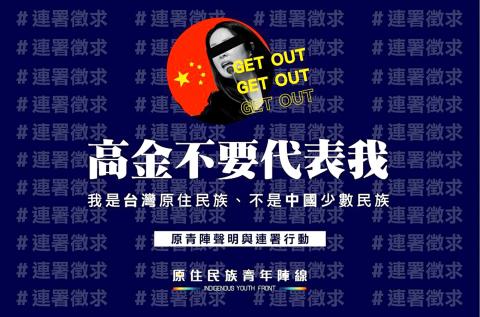An Aboriginal group yesterday criticized Non-Partisan Solidarity Union Legislator May Chin (高金素梅) over her remarks at a summit on cross-strait relations in Beijing.
Chin, who is of Atayal and Manchu ancestry, on Friday claimed to represent Taiwan’s Aborigines at the summit, where she advocated strict adherence to the so-called “1992 consensus” and the idea that “both sides of the Taiwan Strait are part of one China,” the Chinese-language China Times said.
Chin also called for a deepening of the cross-strait relationship and greater unity between the people of Taiwan and China, the paper said.

Photo taken from the Indigenous Youth Front Facebook page
“There is no consensus on the ‘1992 consensus.’ This ‘one China’ you [Chin] speak of has nothing to do with the indigenous people of Taiwan!” the Indigenous Youth Front said in an open letter.
Aboriginal officials should stick to their duties and not use their titles as bargaining chips to accumulate political capital, front representative Savungaz Valincinan said.
“Going to China and engaging in an exchange of personal benefits tramples on and degrades the sovereignty of the nation’s indigenous people,” she said.
Within four hours of its release, the letter, which lambasted other Aboriginal officials, such as Chinese Nationalist Party (KMT) legislators Sufin Siluko, Yosi Takun and Sra Kacaw for “losing sincerity” by promoting closer ties with China, had 500 signatures.
“We are Taiwanese Aborigines, not Chinese minorities. Please do not claim to represent us,” the letter said, adding that Aborigines have never signed an agreement with a modern nation to abandon their sovereign rights, and Aboriginal communities had fought for many years to have their sovereignty respected by the government.
The hard-fought achievements of the Aborigines of past generations made it possible to have the Republic of China Constitution amended to secure equal status and political participation for today’s Aborigines, it said.
Those who take part in political events in China as “Taiwanese Aboriginal representatives” are overstepping the boundaries of their positions, which are to protect the interests of Aborigines in the Legislative Yuan, it said.
Those representing Aborigines in the legislature are not involved at the community level, where local groups and their leaders were already in place, it said.
The failure of China’s “one country, two systems” formula in Hong Kong was proof that Beijing would never respect the sovereignty of Aborigines, it said.
“Although we are not fully satisfied with the current government in Taiwan, we are working hard to change it,” the letter said. “We definitely cannot accept a system that concentrates sovereignty into a single nation and does not respect Taiwan’s diversity.”
The “1992 consensus” — a term former Mainland Affairs Council chairman Su Chi (蘇起) admitted in 2006 to making up in 2000 — refers to an understanding between the KMT and Beijing that both sides acknowledge there is “one China,” with each side having its own interpretation of what “China” means.

The CIA has a message for Chinese government officials worried about their place in Chinese President Xi Jinping’s (習近平) government: Come work with us. The agency released two Mandarin-language videos on social media on Thursday inviting disgruntled officials to contact the CIA. The recruitment videos posted on YouTube and X racked up more than 5 million views combined in their first day. The outreach comes as CIA Director John Ratcliffe has vowed to boost the agency’s use of intelligence from human sources and its focus on China, which has recently targeted US officials with its own espionage operations. The videos are “aimed at

STEADFAST FRIEND: The bills encourage increased Taiwan-US engagement and address China’s distortion of UN Resolution 2758 to isolate Taiwan internationally The Presidential Office yesterday thanked the US House of Representatives for unanimously passing two Taiwan-related bills highlighting its solid support for Taiwan’s democracy and global participation, and for deepening bilateral relations. One of the bills, the Taiwan Assurance Implementation Act, requires the US Department of State to periodically review its guidelines for engagement with Taiwan, and report to the US Congress on the guidelines and plans to lift self-imposed limitations on US-Taiwan engagement. The other bill is the Taiwan International Solidarity Act, which clarifies that UN Resolution 2758 does not address the issue of the representation of Taiwan or its people in

US Indo-Pacific Commander Admiral Samuel Paparo on Friday expressed concern over the rate at which China is diversifying its military exercises, the Financial Times (FT) reported on Saturday. “The rates of change on the depth and breadth of their exercises is the one non-linear effect that I’ve seen in the last year that wakes me up at night or keeps me up at night,” Paparo was quoted by FT as saying while attending the annual Sedona Forum at the McCain Institute in Arizona. Paparo also expressed concern over the speed with which China was expanding its military. While the US

SHIFT: Taiwan’s better-than-expected first-quarter GDP and signs of weakness in the US have driven global capital back to emerging markets, the central bank head said The central bank yesterday blamed market speculation for the steep rise in the local currency, and urged exporters and financial institutions to stay calm and stop panic sell-offs to avoid hurting their own profitability. The nation’s top monetary policymaker said that it would step in, if necessary, to maintain order and stability in the foreign exchange market. The remarks came as the NT dollar yesterday closed up NT$0.919 to NT$30.145 against the US dollar in Taipei trading, after rising as high as NT$29.59 in intraday trading. The local currency has surged 5.85 percent against the greenback over the past two sessions, central